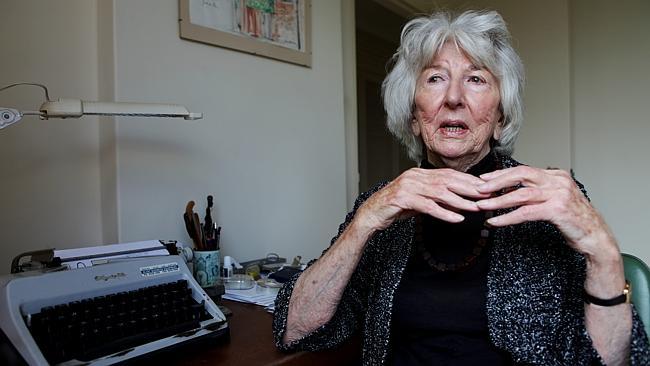Few Days in the Country is Elizabeth Harrower in miniature
Elizabeth Harrower’s short stories depict middle-class Australian mores but with an undertaker-ish glint.

The novel is not a benign form, it was born from entrapment and survival. At first, there were men returning from adventures: Don Quixote, Robinson Crusoe, their harrowing escapes and hard-won wisdoms. Savage pursuers thwarted. But once women got into the game, survival acquired a new edge. What does it mean to survive a family, Jane Austen’s novels ask us, to survive a marriage?
How idle a question you perceive this to be depends on how many happy marriages you have seen. More women have been abducted into marriage than any form of entrapment in human history — and yet the institution lives on with impunity. As you read this, someone somewhere is having diamond slipped on to her finger as a symbol of eternal possession. The spooky resonance of this gesture is surely one of the reasons Elena Ferrante’s novels about a woman growing up in Naples have such power. Reading those books, one gets to watch one of literature’s great escapes.
And here is why the novels of Elizabeth Harrower, four of them published in the 1950s and 60s, and a fifth just last year, represent such a bitterly compelling time capsule. One expects, on cracking open these books, to enjoy the fizzily mean pleasures of looking down one’s nose at history. To bargain at its table with fake chips and to risk losing nothing. Set mostly in Sydney when it was still a town of snake-oil salesmen and Morris Minor imports, the setting even prepares you for a regressive tour of Australia after the war.
The books, however, refuse to remain aloof or distant. The intimacy of their register tastes like blood in the mouth. They are modern-day fairytales, full of children at risk and women who are imprisoned; the only difference is their prisons are the suburbs and the notion of suburban decency. Startlingly, the moves of men such as Felix in The Watch Tower, Harrower’s masterpiece, have not much changed, and Laura, the woman he entraps and tortures, feels as alive and relevant today as she would have 50 years ago. A good survival narrative, as it turns out, is eternal.
Harrower stopped writing these books in the early 70s and although she has said her decision emerged from bruised neglect — “I think I thought, ‘You don’t want me, I don’t want you’,’’ she told the interviewer Ramona Koval — a gentler excuse lurks in the works themselves. An escape too-often repeated ceases to be an escape, it becomes a ritual; just look at the work of Joyce Carol Oates, so full of hunted women and the danger that lurks about them, and yet so erratic in making us feel the terror and necessity of their escapes. Gradually, a ritual loses its power to evoke the loss it usually sanctifies.
And so, Harrower has done something ingenious: she has continued to work, just very slowly, in miniature, writing the same sorts of narratives — of children abandoned and neglected, of girls and women living in the shadow of controlling men — in the short-story form. Now, some 60 years after she began publishing, there is at last a book of them.
Having all of Harrower’s work before us now, the title and presentation of A Few Days in the Country feels blackly, almost sinisterly ironic: this is not an easygoing, blithe tour of bourgeois life and its rusticated retreats. It depicts middle-class Australian mores but with an undertaker-ish glint. Trips to the fair, to vacation islands, to cafes and even to quaint, rainy old Scotland turn out to be bogs of utter boredom and ensnarement, the kind of sojourns that feel so much worse than they actually are because of the gently bullying ways they force you to pantomime certain assumptions — that fun comes prepackaged and in tightly allocated bursts, that talking about one’s friends is a legitimate way to pass the time, and that while men can make mistakes, a woman generally ought not point it out for fear of being ostracised.
One has to think hard of a book in which so much pleasure has been wrenched from so much pain. While the skies are overcast here, what happens on the ground is brightly lit, hilariously cast by lashings of irony and overstatement, forms of comedic lightness well suited to portraying the sturm und drang of male sulks.
“When I go out to work every day, it’s as if I’m on parole,” a teenager says about her father in The Beautiful Climate, an amusing, if sad, tale in which a family renovates its dearly purchased island cabin. Mostly, these jaunts are a theatre for the father’s fury at the world: he is “a man who performs every action on their weekend retreats with his customary air of silent, smouldering violence, as if to punish misdemeanours, alarming his wife and daughter greatly”.
If men hold the power in these stories, women possess an equalling power of perception. Like Colette, Harrower beautifully captures this dynamic at work with the smallest, subtlest framing devices. In The North Sea, for example, a recently divorced woman goes home to her parents in a state of dejection, and calls on an old friend who has married and is raising a kid. The child is not well looked after by the friend’s bumbling husband. “Eventually his clumsiness, something,” the narrator writes, “provoked me into taking the baby while he finished his supper.” In one tiny gesture, Harrower captures the way ineptness in fathering is a form of infantalising laziness: the father must be fed like a child before his child, as if he were a jealous younger sibling.
Set within the context of shorter works, Harrower’s great social observations are bruising and swift. In The Cornucopia, a nouveau riche couple collect new friends, often at dinner parties. Harrower’s description of one such fete is a clinic in the zooming intimacies of privilege: “Frankness can be enchanting, especially in the rich,” she writes, from the perspective of one guest. “It seems so unnatural in them.”
The dim middle-class antihero of The Cost of Things spends most of the story dithering over whether he will tell his wife about his mistress. “Common sense had cabled him at this point,” Harrower writes tartly, “this would all be quite charming, except for one minor problem that springs to mind.” Not his wife, but how he plans to support his lovebird.
If in description Harrower’s tales sound unkind, even a little harsh, it bears repeating that she is a radical writer. This is not someone who is happy with humanity, or remotely cheered by the social order. Her stories are shaped by the refining fires of rage and grief. One needn’t match them up to her life to feel the heat of expensively acquired knowledge.
Time and again, girls and young men here witness a world outside the one they’re living in — and they learn to leap (quickly) at opportunity, even if it comes in unexpected forms. “Books seemed peculiarly irrelevant on this remote hillside smelling of damp earth and wood smoke and gums,” thinks the heroine of The Beautiful Climate, looking at a library in the weekend house probably left behind by the last builder. In a rare moment, Harrower acknowledges not just young girls need this form of escape: that perhaps we all do.
That story, it’s fair to say without giving away the ending, ignites a small torch of light, some hope. So does The Fun at the Fair, a brief tale of a girl going to a county fair and realising all the performances are, well, performances. Many of the others here are studies in confinement or the performances of that confinement, written with such perfection and order that one can only call them devotional.
This is the work of an activist in disguise as an entertainer. “How easily she had divested herself of the girl with interests and pleasant ways,” Harrower writes of one character, dispatching decades of her life. And in a later story comes this dagger: “She was shorter, pruned, slightly murdered.”
Time tried to do this to Elizabeth Harrower the writer. It failed, she survived, and these 12 tales are yet another reason why we ought to celebrate this near miss.
A Few Days in the Country and Other Stories
By Elizabeth Harrower
Text Publishing, 224pp, $29.99 (HB)
John Freeman is the editor of Freeman’s, a new literary biannual available now.


